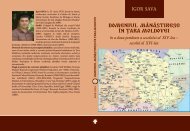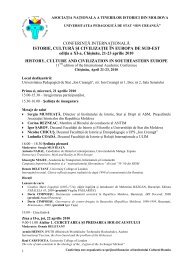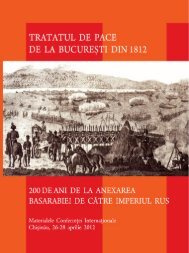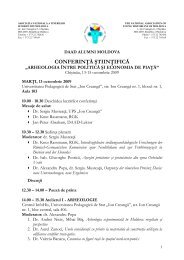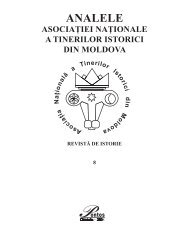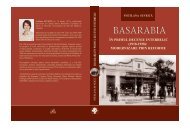LUCIA SAVA, Viaţa cotidiană în oraşul Chişinău la - Asociatia ...
LUCIA SAVA, Viaţa cotidiană în oraşul Chişinău la - Asociatia ...
LUCIA SAVA, Viaţa cotidiană în oraşul Chişinău la - Asociatia ...
You also want an ePaper? Increase the reach of your titles
YUMPU automatically turns print PDFs into web optimized ePapers that Google loves.
210<br />
Lucia Sava<br />
The historiography of the problem (theoretical approach of daily<br />
life). The studies concerning the aspects of the daily life are in very close<br />
connection with those addressing the peculiarity of the mentality. Therefore,<br />
in our study we will make several references to this subject, resulting attitudes<br />
usually progress daily lives of individuals in a certain society of a certain<br />
historical period.<br />
This new and exciting field of history, occurred, in the early twentiethcentury,<br />
historiography in a stream with a strong impact on contemporary<br />
universal historiography (La nouvelle histoire) – which inaugurated a new global<br />
perspective on the past, showing how, or rather methods, manners of past<br />
societies in which people see, perceive and imagine the world around them,<br />
as they see themselves and each other, and value the systems according to<br />
their shape attitudes, behaviors, reactions toward each other, as challenges to<br />
the natural social or political environment.<br />
The new historiography current, oriented on the research of the mentality<br />
and the imagination of a various historical periods in different areas of the<br />
civilization, revalorificated and shared in this context the history of daily life,<br />
trying to be a multidisciplinary approach in the mind; and the researchers<br />
concerned with these problems, use their efforts, procurement of re<strong>la</strong>ted<br />
human social sciences, such as: social psychology, human geography, demography,<br />
history, sociolinguistics, semiotics, etc. Meanwhile, in the center of<br />
historical inquiry is not situated the abstract and universal human being, but<br />
the contrete historical human being, even more the human groups, collectivities,<br />
with their peculiarities.<br />
The historical roots of such an approach, innovative and exciting on the<br />
one hand, complex and difficult on the other one, must be searched deeply in<br />
the history, yet in its nineteenth and early twentieth century.<br />
Some interpretations of this kind could be even earlier. Concerning to the<br />
concept of history seen as an indication modern concept, Reinhart Koselleck<br />
notes that since 1765, in Gottingen, Christian Kestner raises the question:<br />
„If the utility of new history extends to individuals”. Of course, the author<br />
mentions, „the historiography we must portray a human being in his integrity,<br />
not only in rare and special instances, by dominating other people or<br />
dominating and conquering peoples of other countries”.<br />
In the <strong>la</strong>te nineteenth century, some German historians have shown neoranke<br />
unhappy history. Among the most active critics was Karl Lamprecht,<br />
who denounced German official historiography to focus on political history<br />
and historical figures. He called for a „collective history”, which should take



